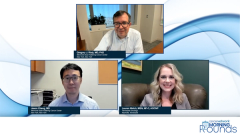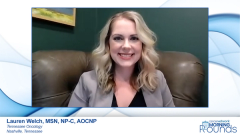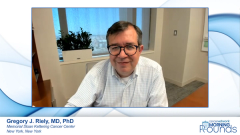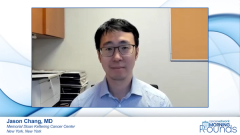
Improving Care in NSCLC: Patient Education Strategies
A brief reflection on optimal patient education strategies, specifically regarding biomarker testing, in the setting of non–small cell lung cancer.
Episodes in this series

Transcript:
Gregory J. Riely, MD, PhD: Lauren, let’s bring ourselves back to the clinic. The challenge that you and I face when we meet a newly diagnosed patient is, they’ve just received this life-altering diagnosis and they’re ready for action. How do you talk about this sort of stuff with patients?
Lauren Welch, MSN, NP-C, AOCNP: You hit the nail on the head. That’s one of the hardest initial conversations to have with patients, especially when they may not necessarily trust you yet; you don’t have that rapport. You’re trying to explain the importance of pausing and waiting to get biomarker testing results. Many patients have never heard of biomarker testing, so when we meet them, they want to have started treatment yesterday. We’ll often spend time in the initial consultation explaining what biomarker testing is, discussing the importance of testing, and the potential impact on therapy selection. Patients often have questions about how long will it take to get the test results back? For patients who have those driver mutations, they’ll frequently ask, “Is this mutation hereditary? Do I need to worry about my family members or having children tested?” Then a subset of patients will want to know how certain biomarker results may impact their response to treatment or even their survival.
Gregory J. Riely, MD, PhD: These are all important questions, and it’s frustrating because you and I sit there and we say, “Well, I’m not sure yet. We’ll have to see what the results look like.” Do you point them to any resources or just encourage them to wait for the results? How do you approach that?
Lauren Welch, MSN, NP-C, AOCNP: I think a couple of different strategies, it really depends on the patient. My resource recommendations vary depending on where the patient is in their diagnosis and their learning preferences. I’m very supportive of and involved with lung cancer patient advocacy groups, and I’ll often refer patients to LUNGevity or the GO2 Foundation. When trying to explain the importance of waiting, the physician I work with has this great analogy where we’ll say, “You could take a road trip to California.” We’re based in Nashville, right? “You could just get in your car and go west, and eventually you’d probably land in California. Or you could take the time to maybe look at a map, figure out the most direct route to get there, avoid some construction zones, maybe get a good place to eat on the way and have a much more successful and faster trip in the long run.” We’re trying to get to the point that if we get this testing back, if there’s something relevant there that could inform that first-line decision, you’re going to have a better outcome.
As far as resources, once we have a result back to go over with patients, I find that LUNGevity has this excellent biomarker testing booklet, which is available in both print and PDF. Then the Biomarker Collaborative has compiled this excellent list of advocacy groups for lung cancer-causing biomarkers. I’ll try to introduce patients to these different resources. One, just for education, but also, I find that patients and their caregivers, they cope better and benefit tremendously when they’re engaged and have support from other patients with cancer.
Gregory J. Riely, MD, PhD: That’s wonderful. Thank you.
Transcript edited for clarity.
Newsletter
Stay up to date on recent advances in the multidisciplinary approach to cancer.









































